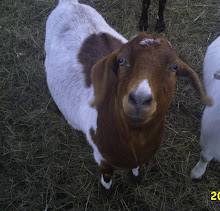 Though goats are generally healthy and hardy animals, it is just a fact that if they are going to get hurt or sick it will often be on a weekend or holiday when vet assistance may not be readily available. If you assemble a first-aid kit and medical supplies ahead of time, you will be ready to handle most health issuses and emergencies. These are the items I keep on hand to care for my goats and handle any emergencies that might come up. Since we breed and raise goats this list may be a bit more extensive than what someone who only has a couple pet goats might need. Please remember that nothing replaces the skill and advice of a good, goat knowledgeable veterinarian and they should be consulted in the proper care and treatment of your goats.
Though goats are generally healthy and hardy animals, it is just a fact that if they are going to get hurt or sick it will often be on a weekend or holiday when vet assistance may not be readily available. If you assemble a first-aid kit and medical supplies ahead of time, you will be ready to handle most health issuses and emergencies. These are the items I keep on hand to care for my goats and handle any emergencies that might come up. Since we breed and raise goats this list may be a bit more extensive than what someone who only has a couple pet goats might need. Please remember that nothing replaces the skill and advice of a good, goat knowledgeable veterinarian and they should be consulted in the proper care and treatment of your goats.The following items are what we keep for supplies and our first-aid kit.
* Lead rope & halter.
* 1 digital rectal thermometer – (Normal temperature for a goat is 101.5 to 104).
* Vaseline / lube - (for taking goat’s temperatures rectally with thermometer).
* 1 bottle isopropyl alcohol – (to sterilize thermometer or other tools)
* An assortment of 18 & 20 gauge 3/4” disposable needles and 1cc, 3cc & 6cc disposable syringes.
* Drench gun or syringe.
* 2 clean dry towels, cotton tipped swabs, stretch gauze, sterile pads, adhesive tape & 2 rolls of vetrap.
* Scissors.
* Latex gloves.
* Duct tape
* Blood stop powder.
* 1 pint hydrogen peroxide and also sterile water to clean wounds.
* 1 container Betadine to treat wounds.
* 1 can or tube of antibiotic spray or ointment to dress wounds.
* A good flashlight and extra batteries.
* stethoscope.
* Save-A-Kid stomach tube & syringe and 1 adult goat stomach tube.
* 1 bottle of therobloat or similar bloat treatment.
* 1 package electrolytes- (to prevent dehydration during illness & stress).
* Toxiban or activated charcoal gel – (For emergency treatment of poisoning).
* Pepto-Bismol – (for the treatment of scours).
* Probios or Calf-Pac – (give when off feed or after antibiotic treatment).
* Worming medication – (Care must be taken to ensure an effective wormer is used).
* Antibiotics – (We keep biomycin-200, Penicillin & Tylan200 on hand).
* CD/T toxoid – (Provide long-term protection against overeating disease and tetanus).
* C/D antitoxin – (For treatment of enterotoxemia caused by Types C & D toxin).
* Tetanus antitoxin – (For immediate but short-term protection against tetanus).
* Poly-Serum – (For use as an aid in the prevention and treatment of intestinal disease and respiratory conditions).
* Epinephrine – (Vet Rx for treating anaphylactic shock, always have it when giving injections).
* Banamine – (Vet Rx - Anti-inflammatory that is good for bringing down high fever).
* Fortified B-complex (good for keeping up appetites and for supportive care).
* Thiamine - (vet Rx - for treatment of thiamin deficiency - goat polio).
* Ammonium Chloride – (for the treatment of Urinary Calculi in bucks & wethers).
* Ketone test strips –(To test does for Ketosis, they can be found at the local drug store).
* Goat Nutra-Drench – (For the treatment & supportive care of anemia, ketosis, or goats that are ill & off feed). I have also had good luck using “Magic”(1 part corn oil, 1 part black strap molasses & 2 parts Karo syrup) in some of these type of situations.
* Hoof trimmers.









3 comments:
This is a good post Jennifer!
Amy
Oh my gosh you need a storge locker for all that. I dont have even 1/2 of those items on hand.
Anne
Thanks Amy!
I really like to be prepared for anything that might come up because there are no goat vets in the area and no vet at all for 20 miles or more. I have found I am able to treat most things myself if I have the medication/tools I may need.
Post a Comment